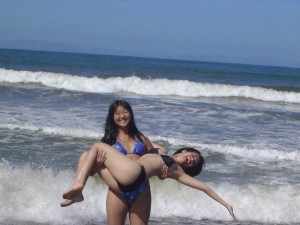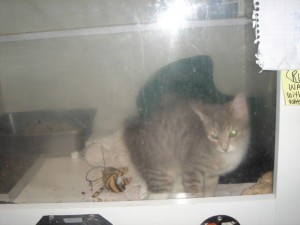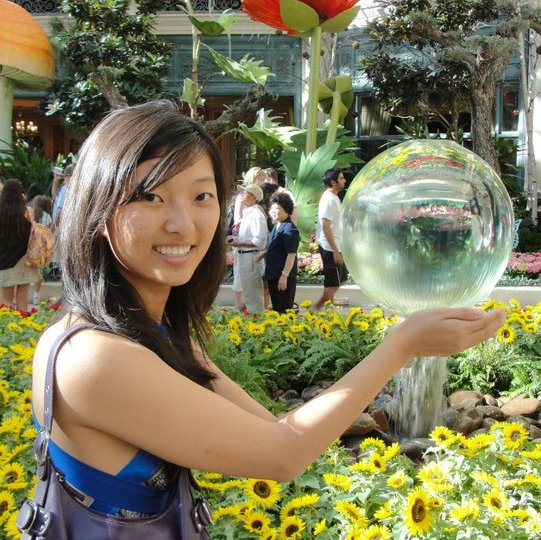Habits are these persistent still suckers that get ingrained in your very subconscious, affecting how you behave often in ways that you can’t help. Since you’re so used to doing things that way, it takes a lot of conscious effort to change how you do it. Even a lot of effort may not always be effective, though with time they can slowly take effect. I’ve been having trouble with this for awhile now, with a very silly behavior. You see, I’m a fidgety person – I like to move around. Well, one of my fidgets is clapping the palm of one hand on the loose fist of the other hand. Can you imagine what that looks like? Turns out it’s considered an insult in Singaporean culture. -___- Hence, I will not take a picture to show you what it’s like. I’ll leave that to your imagination.

I think this is a pretty safe universal sign. photo credit: wpclipart.com
It seems that I like to do it for the very reason it is considered rude – there’s a nice echo and a sort of popping noise you can make by slapping your hands together like that. I also snap my fingers and crack my knuckles because of this desire to make small movements and create a little bit of sound. It breaks both the monotony of staying still and being quiet at the same time (which usually make me feel antsy). Unfortunately for me, I was caught doing this by a very shocked Starfish, who immediately gasped at my gesture and frantically asked me what I was doing. It was also brought up once when I was out with Mizu and some friends. Throughout the rest of that night, I found myself catching myself right after doing it, then hiding my hands or trying to keep them from moving around so much. But time and time again, my hands would find their way from under my legs or untangle themselves from an interlocked clasp to do that action again! It really is difficult to adjust behavior.
This reminds me of my first few weeks in Singapore, when Mizu was overcoming a tendency to overuse “actually” with the help of Starfish and Marylin. Whenever we caught him using it when it wasn’t necessary, someone would be there to clear their throat and ask, “Actually?” Whether he was speaking to us, on the phone, or presenting, Starfish and Marylin kept a close ear on what he was saying. With that sort of persistent watch kept over him, Mizu quickly learned to stop using it and it’s been a long time since he’s used that sentence more than once in a sentence. (Because, actually, when do you actually need to actually use it so many times in a sentence, actually?) 😛

photo credit: weightlosswiththefabulousfatties.wordpress.com
The good thing about behavior is that you don’t need to spend too much time thinking about doing it because it’s rather automatic. However, for that same reason, it can come kick you in the butt because you may automatically do something that you don’t want to or shouldn’t. It’s a trade-off between having more brain resources that can be directed to other thoughts and doing things that you may regret and will have trouble not doing. According to popular knowledge and based on research, it takes 21 days to break a habit. I think I’m nearing that mark… Ultimately, it really is important to develop good habits at a young age, so you don’t have to work so hard to try to adjust your behavior when you’re older.
Take right now, for example. I’ve made a lot of typos because I’m training myself to type with my left thumb and keep my right thumb off the spacebar. Since I’m not used to that sort of coordination, I make the strangest typos without even realizing at times, because my brain sent the right signal, but my fingers didn’t execute properly. Similarly, everyone has certain typos that they tend to make frequently (and often this doesn’t get corrected because of autocorrect) because of how they learned to type. I know I always stumble on certain words and almost never get them right on the first try. I remember I noticed that Katana used to do that a lot with “the,” which always came out as “teh.” Such things are natural when you start typing quickly, but it’s still interesting to compare what I mess up on versus someone else. Old dogs are slow to learn new tricks, aren’t they?




 even TubeSacs for those who want some pillowed neck support. There’s a whole line of removeable covers as well, with textures like Twill, MicroSuede, Velvish, and Phur. Colors and designs also allow people to customize to their heart’s desire, from the basic solid earthy shades to the custom order fabrics of different patterns. Their newer products include an oversized PillowSac that can be used in a multitude of ways and an ottoman doubling as a seat or footrest. And most recently, they’ve come out with Sactionals for any sort of sectional combination you can come up with.
even TubeSacs for those who want some pillowed neck support. There’s a whole line of removeable covers as well, with textures like Twill, MicroSuede, Velvish, and Phur. Colors and designs also allow people to customize to their heart’s desire, from the basic solid earthy shades to the custom order fabrics of different patterns. Their newer products include an oversized PillowSac that can be used in a multitude of ways and an ottoman doubling as a seat or footrest. And most recently, they’ve come out with Sactionals for any sort of sectional combination you can come up with. serendipity, I ran into my friend walking in the hallway with one of his friends and that guy had on a LoveSac shirt!
serendipity, I ran into my friend walking in the hallway with one of his friends and that guy had on a LoveSac shirt!







